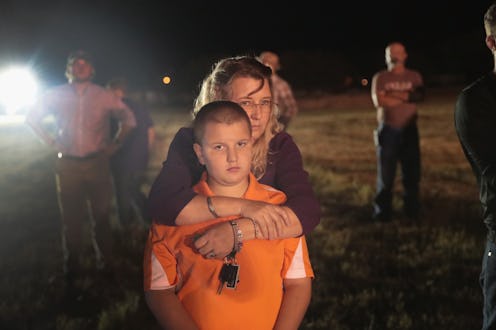News
The Air Force Didn't Cross-Report The Texas Shooter's History Of Domestic Violence

Hours after a gunman killed 26 people at the First Baptist Church of Sutherland Springs in Texas, reports trickled out that the shooter had a criminal history of domestic violence. The Air Force confirmed this on Monday, announcing that the gunman had been court-martialed and imprisoned for assaulting his wife and step-son while serving in the military. But this information was never sent to the FBI, which is part of what enabled the shooter to pass a background check and purchase a weapon. It's a reminder of how frequently mass shooters are domestic abusers — and just as importantly, how vital it is for law enforcement agencies to cross-report criminal histories to one another, especially when domestic abuse is involved.
The Air Force has said it's conducting a review and will do whatever it can to make sure this doesn't happen again. "I've seen this over and over and over, where we find that serial killers, mass killers — they all have domestic violence histories," Lori Post, a professor at Northwestern University who's consulted the Air Force on domestic violence issues, tells Bustle. "But this particular massacre is old-fashioned domestic violence."
Post says that the shooter's attack isn't distinct from his history as a domestic abuser, but that it was in fact a continuation of that abuse.
"It's what we call 'collateral domestic violence,'" Post tells Bustle. "He specifically targeted that church knowing that his ex-wife, or current wife divorcing him, would not be there. He knew that. But [killing her family and friends] was a way for him to gain control."
In a Monday press release, the Air Force provided details of the shooter's criminal history and how it was handled by the military:
[The gunman] was convicted by a general court-martial on two charges of domestic assault against his wife and step-son under Article 128 of the Uniform Code of Military Justice. He then served 12-months in confinement at Naval Consolidated Brig Miramar in California before being released with a Bad Conduct Discharge in 2014. He was also reduced in grade to E-1.
Federal law prohibited him from buying or possessing firearms after this conviction. Initial information indicates that [the gunman]'s domestic violence offense was not entered into the National Criminal Information Center database by the Holloman Air Force Base Office of Special Investigations.
It's unclear why this information wasn't sent to the NCIC. The Air Force said that it has "directed a complete review" of the case to the Air Force Office of the Inspector General; it will also conduct "a comprehensive review of Air Force databases to ensure records in other cases have been reported correctly," and has "requested that the Department of Defense Inspector General review records and procedures across the Department of Defense" to ensure that this kind of thing doesn't happen again.
The Air Force does screen enlistees for criminal pasts and mental health problems before admitting them. But the Sutherland Springs shooter committed the crimes for which he was convicted only after he was discharged, according to Raw Story.
The lack of cross-reporting crimes within law enforcement may not be a problem of individual officials failing to take action. Post, for example, doesn't blame the military. In fact, she says that its process for addressing domestic abuse allegations is "far superior" to that of civilian law enforcement. The issue instead, she says, lies with the larger system of laws and protocols that dictate how such investigations are carried out.
"Everybody's doing a good job. It's the system's problem, and we have to fix the system," Post says. "Communicating incidents of domestic and sexual violence between military and civilian criminal justice agencies would serve society better."